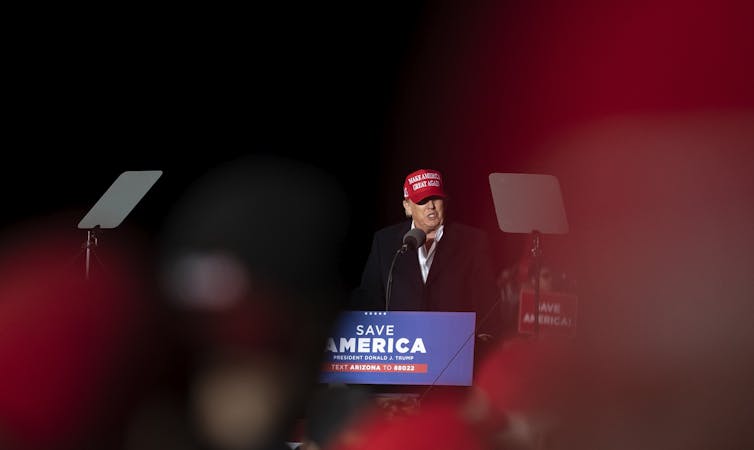
Robert Schertzer, University of Toronto and Eric Taylor Woods, University of Plymouth
At a recent rally in Arizona, former president Donald Trump directly played upon white racial grievances when he angrily declared that “white people” were being “denigrated” and “discriminated against,” and that “if you’re white, you don’t get the vaccine, or if you’re white, you don’t get life-saving therapeutics.”
According to research for our upcoming book, this statement marks an unprecedented turn in Trump’s political strategy.
While Trump is well-known for his willingness to use what are known as racist dog whistles — coded language aimed at attracting racists — to implicitly seek support from white Americans, he had avoided referring to them by name. In Arizona, for the first time, Trump finally explicitly referred to his core constituency: white America.
Trump’s political fate is tied to white voters. They delivered his win in 2016. Approximately 70 percent of the votes cast in the 2016 presidential election were by white Americans: 57 percent of these voters sided with Trump (20 points higher than their support for Hillary Clinton).
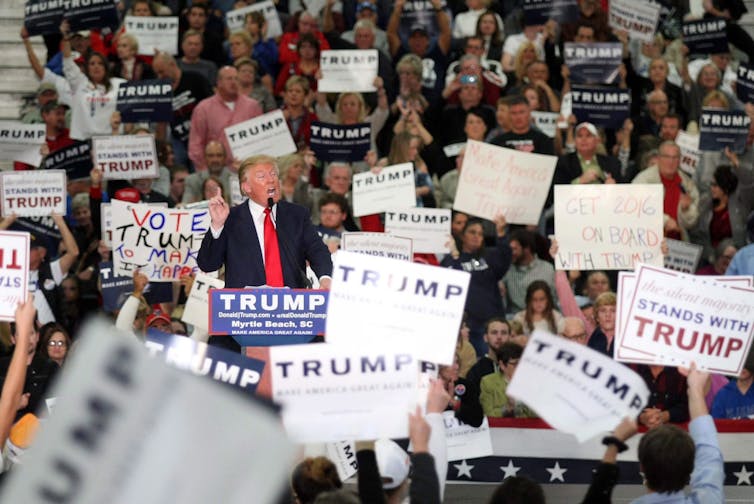
White, non-college-educated voters were particularly important for Trump, preferring him by a margin of 39 points. White people, particularly non-college-educated men, were the core of Trump’s support during his presidency, remaining remarkably loyal to him despite his many controversies and scandals.
One of the interesting turns of the 2020 election was the rise in Trump support from Latino and Black voters. But we need to remember that white voters remained Trump’s main voting bloc in 2020: 58 percent of them sided with him, according to the exit polls.
In both the 2016 and 2020 elections, Trump was able to attract — and maintain — support from white Americans. If Trump is going to run again in 2024, his success will be tied to winning over white voters. And his appearance in Arizona suggests he’s now willing to break even more political norms to court them.
The rise of dog whistles
In the 1960s, the rise of new, anti-racist norms due to the Civil Rights movement meant that the overt use of white racial resentment as a political strategy was no longer acceptable. Of course, this didn’t mean that racism disappeared from American politics. Rather, it began to be used implicitly in the form of dog whistles.
For example, rather than explicitly state his opposition to federally mandated racial integration, 1964 presidential candidate Barry Goldwater — a conservative Arizona senator — used the idea of “state’s rights.”
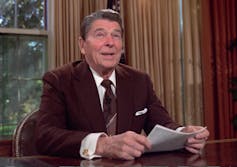
(AP Photo/Scott Stewart)
Similarly, Ronald Reagan curried support from white voters by invoking the image of the “welfare queen,” which played upon white antipathy to Black Americans.
As part of the rise of this kind of dog-whistle racism, direct references to white people largely disappeared from political campaigns. Instead, politicians like Richard Nixon famously referred to the “silent majority.”
‘Drug dealers, rapists’
When Trump emerged on the political scene in 2015, he pushed the boundaries of this tradition of implicit racism. Upon descending a golden escalator and announcing his bid for the presidency, he built upon white antipathy to Mexican immigrants by referring to them as “drug dealers” and “rapists.”
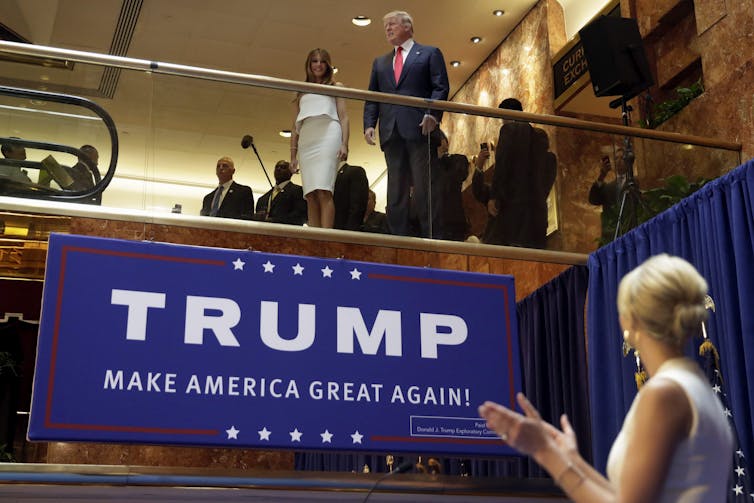
Trump also often spoke about inner cities with large African-American populations as “infested” with crime, drugs, and rodents. He infamously told four congresswomen (Alexandria Ocasio-Cortez, Ilham Omar, Ayanna Pressley, and Rashida Tlaib) to “go back” to where they came from.
And after the 2017 riot in Charlottesville, Va., — which was triggered by a rally of avowed white supremacists and far-right nationalists — he argued there were “very fine people on both sides.”
Perhaps even more telling, when he speaks about Muslims, Trump is almost universally negative.
But while his political strategy represented a new development in the extent to which politicians are willing to overtly use white racial animus to gain support, he nevertheless continued the tradition of not explicitly naming white people as his target audience.
Rather, he referred to “real Americans,” “the silent majority,” or more simply the “movement.”
Sowing racial tensions
Trump’s Arizona speech was different. It was the first time he has so explicitly referred to white people as a group — and the first time he so explicitly pitted them against another group (Black people).
We know this because we have read every Trump tweet sent during his 2016 and 2020 presidential election campaigns for our new book, The New Nationalism in America and Beyond.
In the book, we show how ethnic nationalism defines Trump’s politics — it structures his political messaging and it’s the key to his support. But, even so, not once, in thousands of tweets, did Trump ever refer to white people explicitly as he did in Arizona.
What that rally shows, then, is that Trump has shifted his political strategy. He is willing to more overtly court white voters as a racial group and pits them against other racial groups.
Donald Trump falsely claimed that New York delayed COVID-19 treatme… (Poynter)
At an Arizona rally, former President Donald J. Trump stirred up the crowd with inaccurate c…
Add your highlights:https://t.co/mOxdyGP3ng
#Health— Health Briefly (@HealthNews_b) February 1, 2022
He is willing to directly sow more racial divisions to garner political support and work to undo the anti-racist norms that ascended in American politics in the mid-20th century.
This is extremely dangerous. The fallout from Trump’s first term in office and his political campaigns have already damaged American democracy. If the Jan. 6 insurrection was the culmination of Trump’s implicit racialized politics over the last six years, a more explicit turn could spell even more direct threats to liberal democracy.![]()
Robert Schertzer, Associate Professor of Politics, University of Toronto and Eric Taylor Woods, Lecturer (Assistant Professor) in Sociology, University of Plymouth
This article is republished from The Conversation under a Creative Commons license. Read the original article.

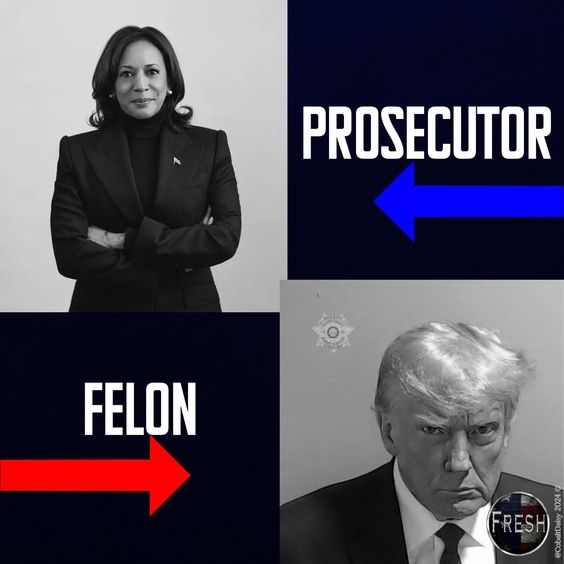

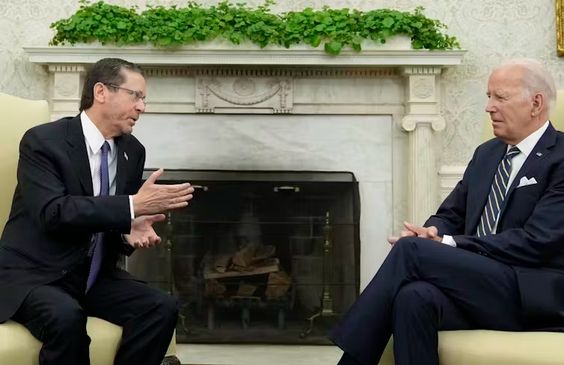
2 Comments
Pingback: buy magic mushrooms usa
Pingback: sex bạo dâm